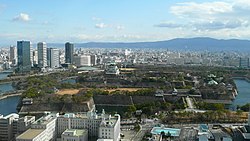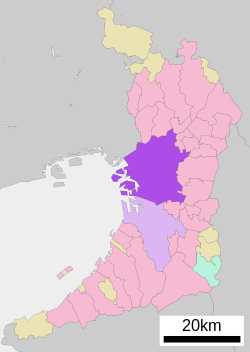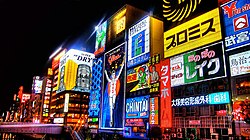Osaka
Osaka (大阪) is the capital city of Osaka Prefecture[1] which faces Osaka Bay and the Seto Inland Sea.[2]
|
大阪 | |
|---|---|
| 大阪市 · Osaka City | |
 | |
 Location of Osaka in Osaka Prefecture | |
| Coordinates: 34°41′37″N 135°30′7″E / 34.69361°N 135.50194°ECoordinates: 34°41′37″N 135°30′7″E / 34.69361°N 135.50194°E | |
| Country | Japan |
| Region | Kansai |
| Prefecture | Osaka |
| Government | |
| • Mayor | [] |
| • Prefectural governor | Hirofumi Yoshimura in office since April 8, 2019 |
| Area | |
| • Total | 223.00 km2 (86.10 sq mi) |
| Population (January 1, 2012) | |
| • Total | 2,871,680 |
| • Density | 12,877.49/km2 (33,352.5/sq mi) |
| Time zone | UTC+9 (Japan Standard Time) |
| - Tree | Sakura |
| - Flower | Pansy |
| Phone number | 06-6208-8181 |
| Address | 1-3-20 Nakanoshima, Kita-ku, Ōsaka-shi, Ōsaka-fu 530-8201 |
| Website | www |
Osaka is in the Kansai region. It is the economic and cultural center of the Kansai region.
Since 1980 it had been the second largest city in Japan.
It is a city designated by government ordinance in Japan and is separated to 24 wards.[3]
Osaka is surrounded by Hyōgo Prefecture, Kyoto Prefecture, Nara Prefecture, Wakayama Prefecture.
History of Ōsaka
Sometimes Osaka is called by its historical name naniwa (なにわ) . Because it is by the sea, it is good for transportation. That is why an ancient emperor made Osaka the capital city. In the early part of the 8th century Naniwa was one of capitals of Japan. In the middle of the 16th century Toyotomi Hideyoshi founded Osaka castle and governed Japan in Osaka. The basis of development of Osaka was prepared in those times. Osaka castle was destroyed once by Tokugawa Ieyasu but Ieyasu choose Osaka as one of the political centers in the Western Japan. He made Osaka a direct dominion of the shogun. During the Edo period Osaka was a center of commerce, finance, pharmacy and other products. It was a center for literature and theater. Kabuki in Osaka is as famous as Kabuki in Edo and Kyoto. It is also known for bunraku (a traditional puppet theater) and manzai (a kind of stand-up comedy).
Traditional Osaka food dishes include okonomiyaki (pan-fried batter cake) and takoyaki (octopus dumplings).
In this region, many people speak a dialect called Osaka-Ben (e.g. "ookini"="thank you").
After the Meiji restoration Osaka was modernized and industrialized. It was a center of Japanese industry. After the World War II its economical importance was relatively less because Tokyo grew as an international city and many companies moved their headquarters to Tokyo. But Osaka is still a large, important city.
Sightseeing spots
- Universal Studios Japan – This is the most famous theme park in Osaka. There are shows, popular characters and musicals.
- Kaiyuukan – This is the most famous aquarium in Osaka. They have animals including whale sharks and penguins.
- Yoshimoto shinkigenki – It is a traditional comedy in Namba Grand Kagetsu.
- Seasonal spots
- In spring, good places to see cherry blossoms are the Mint and Banpakukinen Park.
- In summer, there are displays of fireworks at the Tenzin festival, Yodo river festival and PL art of fireworks.
- In winter, there are Christmas decorations at Nakanoshima and Midosuzi.
Sports
Football clubs in Osaka
Baseball teams in Osaka
- Hanshin Tigers (It is on Hyōgo Prefecture but popular in Osaka too.)
- Orix Buffaloes
Mind sports in Osaka
- Kansai Ki-in (Non-profit organization to promote Go in Osaka)
Osaka Media
Ancient shells found in the Morinomiya kaizuka (Jomon period)
Osaka Exchange in the Kitahama district of Osaka
References
- ↑ Nussbaum, Louis-Frédéric. (2005). "Ōsaka" in Japan Encyclopedia, p. 759.
- ↑ Nussbaum, "Ōsaka-fu" at p. 759.
- ↑ Buhnik, Sophie. "From Shrinking Cities to Toshi no Shukushō: Identifying Patterns of Urban Shrinkage in the Osaka Metropolitan Area," Berkeley Planning Journal, Vol. 23, No. 1 (2001), p. 135 [PDF 4 of 24]. Retrieved 2012-12-2.
Related pages
Other websites
 Media related to Osaka at Wikimedia Commons
Media related to Osaka at Wikimedia Commons Osaka travel guide from Wikivoyage
Osaka travel guide from Wikivoyage












